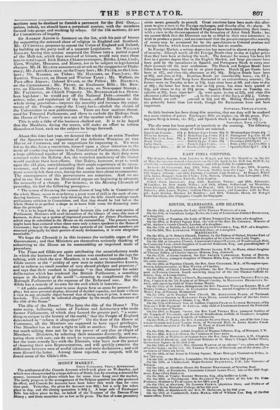About this time last year, we devoted the whole of
an extra Number of the Spectator to an exposition of the defective WORKING OF THE HOUSE OF COMMONS, and to suggestions for improving it. We were
led to do this from a conviction, formed upon a close attention to the mode of condurting business in the -Unreformed Parliaments, that when a large additional number of Members anxious to do their duty were returned under the Reform Act, the wretched machinery of the House would paralyze their best efforts. Our Rulers, however, went to work upon the old plan, notwithstanding their ample experience of its incon- venience, and the moral certainty that such inconvenience would be more severely Mt than ever, during the session then about to commence. The consequences of this perverseness are notorious. And we are glad to see that even the Ministerial organs are beginning to advocate the necessity of a change. For instance, in the Morning Chronicle of yesterday, we find the following passages- " The system of discussing the various clauses of long bills in Committees of the whole House, seems to us to betray a great want of skill in the mode of con- ducting, business. We cannot help thinking that the bills should undergo much preliminary criticism in Committees, and that they should be laid before the whole House in so perfect a shape as to leave little room for discussing more
than the principle. . . . . . .
" It is to be hoped that, in the period between this and the next session of Parliament, Ministers will avail themselves of the labours of some able man of business, to draw up a system of improved procedure for future Parliaments, which may be submitted to the 'House on its reassembling. The-present system might have been endured when there were only a dozen speakers in the House of Conunons; but in the present-day, when upwards of-six hundred- members are returned principally for their powers of ready declamation, .it is now altogether *unsuitable." •
We hope the Chronicle is in this instance the veritable organ of the Government ; and that Ministers are themselves seriously thinking of submitting to the House on its reassembling an. improved mode of procedure.
The Times and Globe are again attributing the unsatisfactory mode -in which the business of the last session was conducted to the rage for talking, with which the new Members, it is said, were inoculated. The Globe sneers at the "avidity of new men to make themselves known, and to redeem no small number of very absurd pledges and promises ;" and says that their conduct is injurious " to that character for sober deliberation which has rendered the British Parliament, a something unique in the history of the world "—meaning to compliment the old Borough Parliaments at the expense of the Reformed one. But the Globe has a remedy of its own for the evil which it laments- " All public assemblies must in some degree- form an arena for personal dis- play; but mere personal display, divested of decided capacity, and made without a view to any attainable object beyond that of being seen in print, is most me- lancholy. This should be reformed altogether by the steady discountenance of the elite of the House."
The elite of the House ! Who form the elite of the House ? The same noisy, hallooing, scions of Fashion and Aristocracy who made former Parliaments, of which they formed the greater part, " a some- thing-so unique in the history of the world," that the People of England determined to "reform it altogether?" On the floor of the House of Commons, all the Members are supposed to have equal privileges. (inc Member has as clear a right to talk as another. The remedy for too much talking does not lie in the power- of any clan or clique of Members. Ministers, by selecting their measures discreetly, and ma- turing them with care, can do much to -repress unprofitable discussion ; but the main remedy lies with the Electors, who have now the power of choosing their own Representatives, and will quickly :perceive the difference between men of useful talents and mere declaimers ; and will soon discard the latter. Among those rejected, we suspect, will be found some of the Globe's elite.
















 Previous page
Previous page